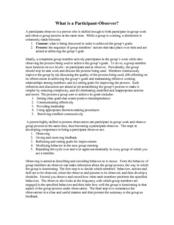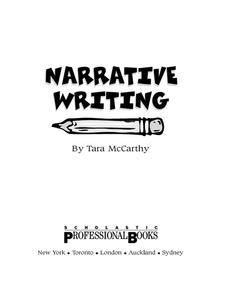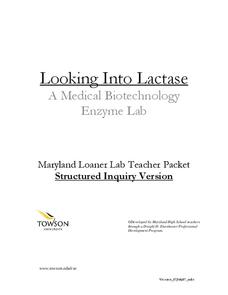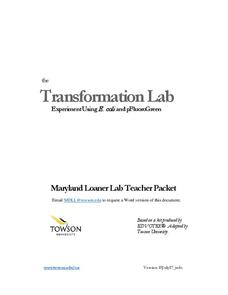Cornell University
Celebrate Urban Birds
Set up a 50x50 square foot area in a space at school and choose three days to go outside and observe the birds seen in a 10 minute span. The activity has learners tapping into their observation skills and creates awareness of the birds...
Curated OER
Participant-Observer Guidelines Handout
Take your collaborative group work to a higher level with this informative handout about the nature, aims, and tasks of participant-observers. Teaching middle and high schoolers how to improve group process advances collaboration skills...
Towson University
Mystery Disease
How did scientists determine the cause of illness before technology? Science scholars play the role of medical researcher in an engaging guided inquiry activity. Using observations, technical reading, and Punnett squares, learners...
Berkshire Museum
Backyard Rocks
You don't have to travel far to learn about rocks, just step outside, pick up a stone, and begin investigating. After taking a class walk around the school grounds collecting rocks, young scientists practice their skills of observation...
Center for Learning in Action
Investigating Physical and Chemical Changes
Super scientists visit ten stations to predict, observe, and draw conclusions about the physical and chemical changes that occur when different states of matter—liquid, solid, and gas—are placed under a variety of conditions. To...
Center for Learning in Action
Water—Changing States (Part 1)
Here is part one of a two-part lesson in which scholars investigate the changing states of water—liquid, solid, and gas. With grand conversation and up to three demonstrations, learners make predictions about what they think will happen...
Center for Learning in Action
Water – Changing States (Part 2)
Here is part two of a two-part lesson in which scholars investigate the changing states of water—liquid, solid, and gas—and how energy from heat changes its molecules. With grand conversation, two demonstrations, and one hands-on...
ProCon
Daylight Savings Time
An entomologist named Geroge Vernon Hudson is credited with proposing Daylight Saving Time (DST) so he could better study his insects. Using the informative website, scholars read a brief introduction to the topic and then explore the...
Scholastic
Narrative Writing
If you're looking to start a unit based around narrative writing, make sure to consider this resource while you're planning. This book covers five topics: writing personal narratives, writing narratives about others, writing...
Towson University
Looking Into Lactase: Structured Inquiry
Why is lactase important? Biology scholars explore enzyme function in a structured inquiry lab. The activity tasks lab groups with observing how temperature and pH affect enzyme activity, as well as determining which milk products...
Center for Learning in Action
Gases
Explore the properties of gases through one activity and two investigations in which super scientists observe the changes gas makes when encountering different conditions.
Curated OER
The 16 Habits of Mind
Study the 16 Habits of Mind with a professional resource. Based on Describing 16 Habits of Mind by Arthur L. Costa and Bena Kallick, the resource details 16 ways learners perceive problems around them and produce ways to deal...
Towson University
Transformation Lab
Transform your class' understanding of genes and antibiotic resistance with the Transformation Lab. Junior geneticists create and observe their own resistant strains of E. coli through research, discussion, and experimentation. The...
McGraw Hill
Arthropods
Are spiders related to crabs? Study the order of arthropods with a reading selection about animal diversity. It provides details about each class within the order, as well as vivid pictures and explanatory charts.
Curated OER
Rocks and Minerals
Take young geologists on an exploration of the collection of rocks and minerals that we call Earth with an upper-elementary science lesson. Through a series of class discussion and hands-on investigations, students learn about the...
San José State University
Essay Outline Template
Inspire essay organization with this handout and exercise about outlining. Writers read through a brief outline model and then practice writing their own outline by completing a second model. Scholars not only complete the outline, they...
Center for Learning in Action
Density
Explore the concept of density within states of matter—gases, liquids, and solids—through a group experiment in which young scientists test objects' texture, color, weight, size, and ability to sink or float.
Towson University
Mystery Tubes
How do scientists know they're right? Truth be told, they don't always know. Explore the scientific process using mystery tubes in an insightful activity. Young scientists discover how to approach and solve problems in science, how ideas...
It's About Time
Chemical Names and Formulas
Abracadabra! Provide your class with the tools to perform a chemical "magic show" as they predict the charges of various ions, determine ionic compound formulas, and make observations to determine when a chemical reaction between...
It's About Time
Reflected Light
The lesson allows young scientists to use lasers and mirrors to study reflected light. A reading passage and homework question assess learning, while additional material introduces extension activities.
It's About Time
Plate Boundaries and Plate Interactions
How does the Earth continually repair itself? Explore the answer to this question, and others, with a unit on plate boundaries and interaction. Pupils classify the types of movement at plate boundaries and identify the...
It's About Time
Concentrating on Collisions
How important is momentum? Pupils investigate and apply the definition of momentum as they conduct analyses during a series of one-dimensional collisions. They infer the relative masses of two objects by carefully staging and predicting...
Classroom Law Project
Should we believe everything we read? Becoming a discerning consumer of media
Class members investigate the role media should play in a healthy democracy. As part of this study, groups analyze political advertising, use FactCheck to assess not only the veracity of but the persuasions techniques used in candidates'...
National Institute of Open Schooling
Chemical Equilibrium
Le Chatelier's interest in thermodynamics and building materials such as cement and plaster led to the Le Chatelier Principle in 1884. Activity 13 in a series of 36 extensively explores chemical equilibrium. Learners read about...
Other popular searches
- Science Observation Skills
- Observation Skills Ppt
- Observation Skills Nursing
- Observation Skills Forensics
- Tefl Observation Skills
- Observation Skills Pot
- Observation Skills Scince























